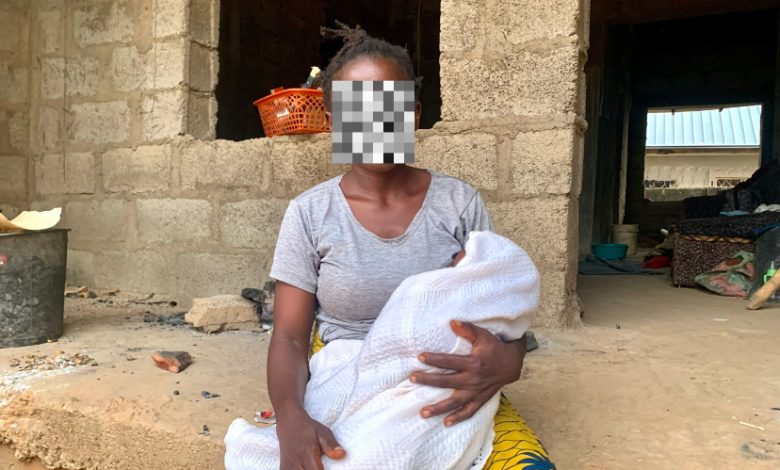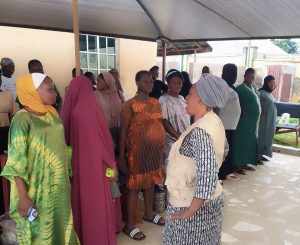
In the serene suburb of Karshi, on the outskirts of Nigeria’s capital city, Abuja, lives Mrs Jennifer Audu. At 36, Audu’s life is a delicate balance between caring for her children, running her small hairdressing business, and coping with a struggle that is largely unseen and unspoken: maternal mental health issues.
Sitting outside an uncompleted building she has known as home; Audu recounts her ordeal with a weary smile. “Since the birth of my first child 12 years ago, I have been using the Intra-Uterine device (IUD) birth control method. I took it out whenever I desired to have another child. It has been successful until last year, 2023. One morning in April, I noticed that I was feeling this unusual urge to throw up. This continued for three days, and so I decided to get tested. It showed I was pregnant. I wondered how that was even possible since I still had the IUD on.”
A visit to the family planning unit at Karshi General Hospital revealed that the IUD got displaced, rendering it ineffective. For Audu, the news was devastating. “I have had three children – 12, 9, and 5 – and wasn’t ready for another child anymore. Look at how expensive things are. With the three children, it’s been a struggle for my husband, a site worker, to feed them. I am a hairdresser. It has been difficult for us to pay rent, feed, and even clothe ourselves.”
Her eyes well up as she describes the emotional turmoil that followed. “My religious beliefs and the law against abortion in Nigeria would not let me abort the baby either. All through my pregnancy, I was unhappy. At some point, I felt like taking my life.”
Without the means to seek professional help, Audu turned to faith as her condition was considered by many as a spiritual attack. “I was always going to church and praying to God about it. I was also told that mental health cases are demonic attacks. So, I turned to God for deliverance as it was hard to talk to people about it.”
Audu’s experience is a stark reminder of a silent crisis affecting countless women across Nigeria. Maternal mental health, particularly during the perinatal period —the time during pregnancy and up to a year after childbirth— is a critical issue that remains largely overlooked.

The Extent of the Crisis
Globally, the World Health Organization (WHO) estimates that 10% of pregnant women and 13% of women who have just given birth experience mental disorders, primarily perinatal depression. In Nigeria, the burden is even higher, with approximately 25% of women experiencing mental health disorders during the antenatal period and 19% during the postnatal period.
According to the global health body, perinatal depression in Nigeria affects up to 30% of women, significantly higher than the global average. These disorders, primarily perinatal depression, not only affect the mother’s ability to care for her child but also increase the risk of suicide, a leading cause of maternal deaths in developing countries. Perinatal mental health disorders are linked to maternal morbidity and mortality, with one in five mothers of full-term infants suffering from these issues, WHO says.
Beyond the immediate impact on mothers, perinatal mental health disorders have significant short- and long-term repercussions on the physical, cognitive, and emotional development of their babies. These include preterm birth, low birth weight, poor mother-to-child interaction, infant undernutrition, stunting, poor infant development, and increased dropout rates for recommended immunisations.
Government efforts
Recognising the gravity of the situation, the Nigerian government has made strides toward addressing maternal mental health. The National Mental Health Act, enacted in January 2023, aims to integrate mental health services into primary healthcare.
Signed into law by former president Muhammadu Buhari on January 5, 2023, the Mental Health Act provides a legal framework to ensure that mental health services are accessible to all, especially vulnerable groups like pregnant and postpartum women.
However, implementation of the act remains a challenge due to inadequate funding and trained personnel to bring these services to the grassroots.
In April 2024, Prof. Muhammed Ali Pate, the coordinating minister of health and social welfare, reiterated the readiness of the federal government to reduce maternal mortality and newborn child deaths by providing adequate funding to 8,800 health facilities across the country.
“That is an aspiration, we are not there yet but it is what we should be aiming for, so that no woman is left behind when it comes to access to quality maternal care, access to skilled birth attendants, mental health assessments, facility birth delivery and non-communicable diseases screening, like hypertension, diabetes in pregnancy and family planning and to ensure affordability to the vulnerable group fund as the National Health Insurance Authority (NHIA) provides cover to reduce access to care for women,” Pate says.
Prof. Pate adds the government aims to reach at least seven million pregnant women through those services and at least six million newborn births annually.
Despite these efforts, many women still fall through the cracks. Audu’s story highlights the urgent need for more robust support systems.
After giving birth through a cesarean section, her mental state hindered her recovery. “I still don’t feel okay, but I don’t know where to go. Even if I know, where is the money?” she asks with tinge of frustration.
NGO interventions: The Wellbeing Africa Foundation
Across Nigeria, civil society organisations are recognising the need for comprehensive maternal mental health support and are working tirelessly to fill the void.
In the heart of Ilorin, capital of Kwara State in Nigeria’s north central region, another woman, Karimot Adeoye, shares a tale similar to Audu’s. “After my third child, I couldn’t sleep. I was constantly anxious and worrying about everything. The noise of the children, the financial stress, everything became too much,” Adeoye recounts. “I felt like I was drowning, and no one could see.”
She sought help from The Wellbeing Africa Foundation through the Mamacare360 programme. “The counsellors there understood what I was going through. They didn’t judge me or make me feel weak. Instead, they helped me find ways to cope and take small steps toward feeling better,” Adeoye recounts.
The foundation’s work in Ilorin is part of a broader movement to address maternal health issues across Nigeria. By providing training for healthcare workers, connecting women with healthcare providers, offering community support programmes, and running awareness campaigns, the foundation aims to create a more supportive environment for mothers.
The foundation’s initiatives go beyond counseling to include community outreach and education programmmes aimed at reducing stigma and increasing awareness.

Toyin Saraki, founder-president of The Wellbeing Africa Foundation, is a global health advocate. She emphasises the importance of community-based support in tackling the problem of maternal mental health.
“Maternal mental health is not just a medical issue; it’s a societal one. We need to create safe spaces where women can talk about their struggles without fear of judgment,” Saraki says.
Through its Mamacare360 programme, The Wellbeing Africa Foundation provides counseling and support to women like Audu, helping them navigate the complexities of maternal mental health.
“We have trained counsellors who work with these women, offering them a listening ear and practical advice,” Saraki explains. “We also help raise awareness about these issues to reduce the stigma associated with it. I believe that when we support our mothers, we support our future.”
With over two decades of advocacy covering maternal, newborn, and child health, gender-based discrimination and violence, Saraki advocates the integration of mental health services into routine maternal care.
Her tireless efforts have brought attention to these issue, sparking conversations and prompting action at both the community and governmental levels.
Yet, there is still much work to be done as in many parts of Nigeria, mental health services are scarce, and the stigma surrounding mental illness remains.
“We need to break the silence around maternal mental health. It’s not something to be ashamed of. First is that mental health assessments should be a part of regular healthcare, especially for mothers. They are the backbone of our society,” Saraki says.

Best Practices and Expert Insights
Experts say tackling maternal mental health issues in Nigeria requires a multifaceted approach. The WHO guidelines for integrating perinatal mental health into Maternal and Child Health (MCH) services provide a roadmap, focusing on promoting, preventing, and treating perinatal mental health conditions. This involves creating supportive environments to reduce stigma, providing psychoeducation, stress management, and social support, and implementing mental health condition recognition through screening and risk factor identification. Training healthcare workers to recognize and address mental health issues is essential.
Esther Olabisi Olowokere, a mental health nurse consultant with the West African Postgraduate College of Nurses and Midwives, outlines best practices for addressing maternal mental health in Nigeria. She emphasises the need for promoting positive mental health through good ante/postnatal care, social support, accessible mental health management, rehabilitation, and women empowerment.
“The government needs to prioritise mental health initiatives and services for women, fund research and implementation and provide essential drugs for women battling this problem,” Olowookere says.
Rasheedat Balogun, a mental health communication specialist, highlights the importance of enlightenment and education. “Because of how stigmatised mental health is in Nigeria and Africa, it is difficult to know that many mothers are battling mental health issues. Most times, we do not know how to recognise this problem. And so, when a mother is going through postpartum depression or postpartum anxiety for instance, they ascribe it to spiritual issues.”
Balogun stresses the need for proper mental healthcare and counseling access for women, training for healthcare providers to recognise signs of distress, and sensitisation at the community level to reduce stigmatisation.
“Most healthcare facilities, particularly primary health centers where many Nigerian women receive antenatal and postnatal care, are often inadequately equipped to provide mental health services. Mental health services are typically concentrated in secondary and tertiary healthcare facilities, leaving many women without access to necessary support,” Balogun says.
“The hospitals in rural communities only focus on childbirth and care for the baby during antenatal visits. The mental health of the mother is largely neglected. When a mental health disorder is left untreated, it can lead to a tougher disorder. Increased sensitisation and education of mothers, nurses, healthcare providers and community members are crucial,” she adds.

Balogun suggests education about maternal mental health should be integrated into antenatal care, ensuring that mothers and their families understand that seeking help is normal and necessary. “Community-based programs should be expanded to provide accessible mental health support, particularly in rural areas where healthcare infrastructure is weak,” she says.
Balogun also believes that economic empowerment and social support systems can alleviate some of the pressures that contribute to maternal mental health issues. “Providing financial assistance, affordable childcare, and employment opportunities can help reduce stress and improve mental well-being. Government policies should ensure that maternal mental health services are included in primary healthcare packages, making them accessible to all women,” she says.
Olowokere advocates increased collaboration between government agencies, NGOs, and community organizations. Organizations like The Wellbeing Africa Foundation demonstrate the impact of local support networks. These groups can provide counseling, education, and advocacy, creating a holistic support system for mothers.
Continuous monitoring and evaluation of maternal mental health programmmes are essential. “Collecting data on the prevalence and impact of mental health issues among mothers will help refine policies and interventions, ensuring they are effective and responsive to the needs of Nigerian women,” Olowokere adds.
This report was supported by the Wole Soyinka Centre for Investigative Journalism (WSCIJ) under the Champion Building component of its Report Women News and Newsroom Engagement project.





